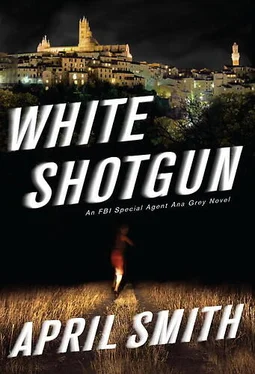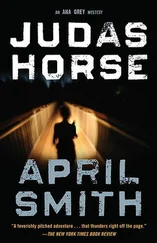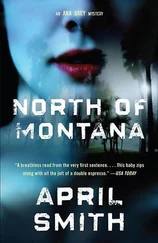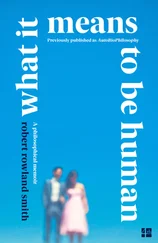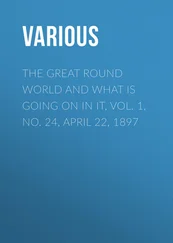April Smith - White Shotgun
Здесь есть возможность читать онлайн «April Smith - White Shotgun» весь текст электронной книги совершенно бесплатно (целиком полную версию без сокращений). В некоторых случаях можно слушать аудио, скачать через торрент в формате fb2 и присутствует краткое содержание. Год выпуска: 2011, ISBN: 2011, Жанр: Триллер, на английском языке. Описание произведения, (предисловие) а так же отзывы посетителей доступны на портале библиотеки ЛибКат.
- Название:White Shotgun
- Автор:
- Жанр:
- Год:2011
- ISBN:978-0-307-59679-6
- Рейтинг книги:4 / 5. Голосов: 1
-
Избранное:Добавить в избранное
- Отзывы:
-
Ваша оценка:
- 80
- 1
- 2
- 3
- 4
- 5
White Shotgun: краткое содержание, описание и аннотация
Предлагаем к чтению аннотацию, описание, краткое содержание или предисловие (зависит от того, что написал сам автор книги «White Shotgun»). Если вы не нашли необходимую информацию о книге — напишите в комментариях, мы постараемся отыскать её.
White Shotgun — читать онлайн бесплатно полную книгу (весь текст) целиком
Ниже представлен текст книги, разбитый по страницам. Система сохранения места последней прочитанной страницы, позволяет с удобством читать онлайн бесплатно книгу «White Shotgun», без необходимости каждый раз заново искать на чём Вы остановились. Поставьте закладку, и сможете в любой момент перейти на страницу, на которой закончили чтение.
Интервал:
Закладка:
“So there’s no way to ID the guy?” “Mr. Khan is sitting down with a police artist as we speak. It’ll be interesting if he comes up with a description of the same guy you saw in South Kensington.” “How did he contact the buyer?”
“The car was sold on Craigslist. They met in a parking lot. Like I said, no paperwork, but Mr. Hafeez did keep one remnant of the transaction. He didn’t remember at first, but he still had the buyer’s phone number. Are you with me?” “Barely.”
“Mr. Khan is a butcher, so what does he do? He writes the phone number of the guy who wants to buy his car on a piece of paper and sticks it on that nail where they put the receipts. The Met Police search his shop and it’s still there. You know that nail thing?” “Yes, I do.” My eyes are closing.
“Just like they have in every New York deli. They have them in London, too. And this entire case could turn on it. One nail. I thought that was something.”
SEVEN
Cecilia decides to give a party in my honor. It will be outdoors by torchlight at the abbey, in the ruins of the original church. I guess this is why she keeps banquet tables stacked up in the dining room, ready to roll. Someone else will do the cooking, but the key ingredients have to be assembled according to Cecilia’s standards, from individual shopkeepers she’s known for twenty years in the district of the noble contrada of Oca in the heart of Siena.
Oca district is clearly marked by green and white silk with a crowned white goose flying from every building — as opposed to Oca’s blood enemy, Torre, the Tower, whose blue and burgundy banners, showing an elephant carrying a tower, warn that you are entering enemy territory. Just like gangland L.A., sporting the wrong colors in the wrong district during Palio is either a deliberate challenge or just plain stupid.
We are dutifully wearing Oca scarves, flowing capelike over the shoulders, as we haul string bags filled with groceries up the forty-five-degree incline of Arte della Lana; it’s barely ten in the morning, and my neck is prickly with perspiration. We turn a corner and the street drops to S. Andrea Gallerani in a heartbeat. Ahead is another rise. If you graphed it, our little shopping trip would look like a killer hills workout on a treadmill.
And yet Cecilia is stepping doelike over the pavers in high heels and an Armani dress with tiny dots that she will later wear to the hospital, movie star sunglasses, and a buckle-encrusted marigold leather purse as big as a watermelon. I notice that the other women, young and old, all of them in Oca scarves like flocks of green and white hens, are also carrying handbags and wearing dresses — tailored cotton with belts, or splashy bosom-revealing rayon — going about their morning business with self-assured femininity. And here I am, dressed L.A.-style for a day in the sun: hiking shorts, adventure shoes, water bottle, and baseball cap, trudging behind.
Cecilia is so in charge of her world, you forget that it isn’t her world. Passing a shop with eye-catching patterns of blush peaches and dark plums reminds her of helping her mother at the fish store in El Salvador when she was five years old. Her stories are told in clean, thought-out paragraphs. Reflexively running Cecilia through my FBI profiling machine, I assess her as a high-functioning, fiercely well-organized, extroverted personality. Which means it will not be easy to get past her defenses. When she feels secure, she will tell me her secrets; why she asked me here and what her husband is up to. I must be patient.
“I had to arrange the fishes on the ice so that they looked like flowers.” She describes the design with a doctor’s hand — long fingers, graceful and strong — gold bracelets jumping. “I was also working in the house. We had no housekeeper — no need for one since we didn’t own things. We had coffee bushes growing everywhere, like weeds, and when I was little, I would pick the beans when they were red and sell them at the market. I would help with the laundry and take care of the pets. I had two dogs; they were my most beloved things in the world.” “I couldn’t have pets,” I say. “My grandfather wouldn’t allow it. I used to talk to the worms in the backyard.” Cecilia laughs so hard she chokes and almost stumbles. “Playing with worms? That’s very sad.” “I was happy when it rained and all my friends came out.” “Stop, you are making my makeup run!” She dabs her eyes under the sunglasses. It pleases me to amuse her. Not everybody gets my jokes, especially at the Bureau.
“We had beautiful wild birds,” she goes on. “We kept them in cages. I loved them, too. You know who was my favorite? That yellow one in the cartoon who is always making trouble, what is he called?” “Tweety Bird?” I ask incredulously.
Cecilia laughs again and blushes. “Yes, that’s him.” “You had one, a toy?”
“No, just a tiny room and a lamp. On the walls, I painted that little bird. I would spend hours painting him. It took me away from my homework or when I was overwhelmed and stressed out. My mother sent my brothers and me to private Catholic school, and then to the university — with no support from the government. My aunts and their husbands gave money to pitch in with my studies, so I had to do well.” “And our father? Miguel Sanchez?” “He wasn’t there,” Cecilia reminds me quietly. “He was in America, remember? Married to your mother.” “Not for very long.”
I am struck with a pang of envy. What if my absent father did spend more time with his El Salvadoran family? What difference can it make now?
“I guess we have that in common.” “What?”
She asks this kindly, as a question.
“It’s funny, but we both grew up without the same father. I have virtually no memory of him. Except for one blurry image … He’s just not there. And you didn’t get much of him, either.” “A little more, perhaps. I know his face. He was very friendly-looking. I’ll find that picture. He was playful, and he enjoyed making jokes, like you.” “You and I, we each have pieces missing.” After a silence, Cecilia says, “True.” “And we’re both half-and-half. You’re from El Salvador, but you might as well be Italian.” “I am not one thing or another,” Cecilia says.
Around the tourist attraction of the Church of Sant’ Antonio Abate there are stores with bombastic windows crowded with cheeses, chocolates, sausage, and mountains of gorgeously wrapped panfòrte, the signature fruitcake of Siena, with seventeen ingredients — one for each contrada — and hard as the brick of the houses that surround us in an almond-colored maze. The old lanes tilt and curve, go uphill and down and return to the starting point, like the meandering talk between us.
“What made you search for me?” I venture. “Why now?” “Didn’t you read my letters?” Cecilia asks. “I thought you knew about the inheritance.” “Yes, you mentioned it, but I wasn’t sure.” “You have an inheritance coming from the family. It’s small — a couple of thousand euros. It came when we sold the fish market, after my mother died.” “Thank you,” I say. “That’s very honorable of you to seek me out.” “I did want to meet you, after all these years.” “You made a big effort.”
“It was the right thing to do,” she says. “The money belongs to you.” She sounds awfully matter-of-fact, compared to the emotion in the letters, in which she begged for information about the American relation she had held in her heart for many years. Is she disappointed in what she found? Or, faced with it, has she reconsidered whatever bold moves she imagined?
As we walk, I’m figuring out how to go deeper. It is afternoon, and from the rows of houses, scores of green shutters have opened to the breeze. Old people are everywhere. And happy, too. They watch from doorways or perch on wooden fruit crates that they pick up and move as the sun moves. Cecilia introduces me to each and every nonna, it seems, and they respond with sweet attempts at English. “Hear you soon!” Finally we come to a small square with a fountain and another church.
Читать дальшеИнтервал:
Закладка:
Похожие книги на «White Shotgun»
Представляем Вашему вниманию похожие книги на «White Shotgun» списком для выбора. Мы отобрали схожую по названию и смыслу литературу в надежде предоставить читателям больше вариантов отыскать новые, интересные, ещё непрочитанные произведения.
Обсуждение, отзывы о книге «White Shotgun» и просто собственные мнения читателей. Оставьте ваши комментарии, напишите, что Вы думаете о произведении, его смысле или главных героях. Укажите что конкретно понравилось, а что нет, и почему Вы так считаете.
